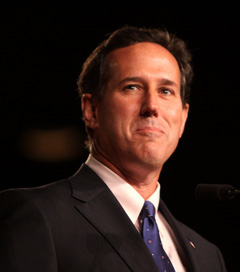Support justice-driven, accurate and transparent news — make a quick donation to Truthout today!
Rick Santorum has taken the role as the family values candidate in the GOP presidential primary and won a few upsets in the Midwest with the help of Christian voters. Santorum's track record of offending gay people and just about everyone else who isn't a social conservative proves he's a seasoned culture warrior, but is he a seasoned drug warrior?
The answer: yes, Santorum qualifies as a drug warrior, but he does not appear to be seasoned.
Like Mitt Romney, Santorum has been quiet about his positions on domestic drug policy. His web site offers “faith & family” proposals to put a stop to gay marriage, abortion and the distribution of pornography, but there is nothing about stopping heathen sodomites and amoral leftists from using illegal drugs.
Santorum does promise to complete a wall on the Mexican border and increase drug seizures there, but his drug war proposals are more vague than Romney's, who at least used the terms “narco-terrorist” and “Colombia” in his policy papers.
He may not be talking about it on the campaign trail, but Santorum is worried about narco-terrorists. Very worried. During a recent stint between politician jobs at the right-wing Ethics and Public Policy Center, Santorum published a hawkish series on the international threats to the United States called “The Gathering Storm.” The series focuses on Iranian and Islamic terrorist threat, but several pieces address the bloody drug war in Mexico, which he suggests should be a top national security priority for the Obama administration without offering any strategy or policy proposals.
In one piece, Santorum sources several right-wing writers and publications to link drug cartels south of the border to Venezuelan president Hugo Chavez, and then, to link Chavez to narco-communist terrorists, and all of these evildoers to Hezbollah and Iran. The Chavez-Iran-drug cartel conspiracy is “the primary threat to the United States in Latin America,” he claims, but still Santorum does not offer any policy proposals to combat this apparent threat, which some international observers continue to doubt even exists.
Santorum wants to fight the drug war abroad, but he has not said much about the drug war at home. Luckily, several videos compiled by Students for Sensible Drug Policy (SSDP) provide a look inside Santorum's head when it comes to drugs.
SSDP's videos and Santorum's campaign statements do make one thing clear: he thinks drug use is harmful to society and against America's “core values.” He has not figured out how to translate his views into specific policy, however. In fact, he doesn't seem to have drug policy figured out at all.
At a campaign event in New Hampshire, a drug reform activist asked Santorum if, as president and a so-called champion of “family values,” he would continue to “destroy families by sending nonviolent drug offenders to prison.”
“The federal government doesn't do that,” Santorum responded.
The federal government does in fact do just that. Had Santorum taken a look at data provided weekly by the Justice Department, he would know that nearly half of all inmates in federal prison are drug offenders. Some of them surely have kids at home.
Then there is Irina Alexander, SSDP's star pot smoker. To put a human face on the incarceration issue, Alexander asked each major GOP candidate, on video, if she should be incarcerated for using marijuana.
“Santorum, on one day, tells us that the federal government should be involved in drug policy, and on the next day, when I confront him and ask him if I should be arrested for my marijuana use, he said it depends on my state's laws,” Alexander said.
Alexander later, this time in front of more onlookers, asked Santorum if his earlier comment meant he was in favor of states figuring out their own drug laws. Santorum said the federal government does have a role in keeping drugs out of the country, holding users accountable and making sure states don't legalize dangerous drugs.
In another video, Santorum expressed a similar position on states' rights and medical marijuana laws, but only after stumbling through euthanasia, sterilization, abortion and gay marriage.
Santorum was better versed in these hot-button issues and admitted that he didn't know his medical marijuana laws very well. The audience corrected him after called marijuana a “narcotic,” but he claimed to be familiar with the hazards of weed because he “went to college, too.”
The term “narcotic” is normally reserved for hard depressants, painkillers and opiates. The federal government does consider marijuana a Schedule I drug, a classification that ranks weed with drugs like heroin that have a “high potential for abuse” and “no currently accepted medical use in treatment.” Considering that doctors prescribe medical marijuana to patients in 16 states, and that a growing body of research has shown that marijuana is less addicting than alcohol and tobacco, federal marijuana policy seems to be stuck in the dark ages. If Rick Santorum becomes president, expect it to stay that way.
Media that fights fascism
Truthout is funded almost entirely by readers — that’s why we can speak truth to power and cut against the mainstream narrative. But independent journalists at Truthout face mounting political repression under Trump.
We rely on your support to survive McCarthyist censorship. Please make a tax-deductible one-time or monthly donation.

